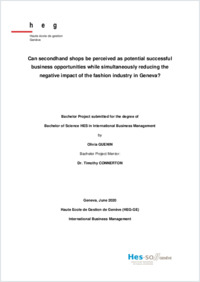Can secondhand shops be perceived as potential successful business opportunities while simultaneously reducing the negative impact of the fashion industry in Geneva ?
SONAR|HES-SO
- Guenin, Olivia
- Connerton, Timothy (Degree supervisor)
-
2020
109 p.
Mémoire de bachelor: Haute école de gestion de Genève, 2020
English
The fashion industry is one of the most polluting industries in the world (McFall- Johnsen, 2019). Simultaneously the industry is extremely lucrative; the business dedicated to the sale of clothing is worth around $ 1.3 trillion globally in 2016 and is forecasted to reach $1.6 trillion in value in 2020 (Sheng, 2017). The global demand for clothing is growing rapidly and therefore, there is a need to understand the environmental impact generated by the textile industry in order to identify alternative solutions to fast fashion. At this very moment, the textile waste crisis is accelerating; consumers are buying more clothes than ever before but wearing them half as long (Thredup, 2019). As a consequence, most of these items are thrown away before their real usability ends, a phenomenon termed as “throwaway culture” (Birtwistle, 2007). The European Parliamentary of Research has identified the extension of longevity of clothes as an influential way to decrease the negative impacts of the fashion industry on the environment. Mainly revived in the beginning of the 20th century due to the switch of consumers’ perception and the rise of awareness on the environmental impact related to the fashion industry (Thredup, 2019). The popularity of second-hand shops has increased and become a socially acceptable and reliable alternative to regular retailers (Brace- Govan and Binay, 2010). The aim of this thesis is to examine consumers’ behavior and purchasing factors by studying the city of Amsterdam, where secondhand shopping is an integral part of the consumers purchase culture, in order to determine the market potential for a secondhand shop in Geneva. In the context of this thesis, the term successful is defined as a business opportunity that is able to be both financially profitable while being perceived by the general public as a desirable place to shop. In Geneva, the desire to support sustainable and ecofriendly alternatives to fast fashion suggests that there is significant market potential in the city for this kind of business model, if attention to detail is given. Through research and the distribution of surveys, it was identified that affordability, quality materials and adherence to current fashion trends are the most important factors consumers’ take into consideration while purchasing clothes. With these determinants in mind, there is notable room for industry initiatives that adhere to shoppers concerns while also minimizing environmental damage. The detrimental impact of the fashion industry on the environment is an issue that effects consumers all over the world. Secondhand shops have proven to be great alternatives to supporting fast fashion (Rendon, 2020). This thesis will examine the potential of a secondhand shop in Geneva that would support more ecofriendly enterprise's whilst still being attractive to consumers.
- Language
-
- English
- Classification
- Economics
- Notes
-
- Haute école de gestion Genève
- International Business Management
- hesso:hegge
- License
- License undefined
- Identifiers
-
- RERO DOC 329847
- Persistent URL
- https://folia.unifr.ch/global/documents/315088
Statistics
Document views: 416
File downloads:
- Bachelor_Thesis_Olivia_Guenin_IBM_2020.pdf: 823
